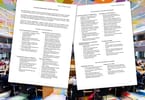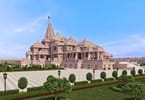“I used to call them the spoiled brats of the internet,” one Cairo woman confessed. “Now I kiss their feet,” she said, referring to young men who broke the Egyptians long record of endurance under a dictatorial regime.
Today, the seventh day of the revolt against President Mubarak and for democracy in Egypt, 2 million people are said protesting in Cairo. Some have estimated 8 million nationwide; that’s 10% of the population and that, technically speaking, is a revolution.
In Alexandria, the people are standing shoulder to shoulder from one end of that long city to the other.
It’s not the usual protestors; everyone knows them – like the Kifaya party (Enough) and the April 6 movement people.
No. This is everyone: we see huge clusters of women in their bright colored scarfs – like a meadow in spring – and the men don’t even flirt with them because the ethic of protest is respect.
Crowds open up for people in wheelchairs and assist those walking with canes.
The people, once assured that the Army’s interest was in protecting them, fell into easy cooperation. Troops and people parade side by side, Egyptian flags raised. They work together to check people for weapons.
People who live near Tahrir Square cook for the protestors. In Helwan, south of the city, supplies of cooking gas ran out. Some of the young men in the area located supplies in a neighboring area and delivered them back to Helwan, door-to-door.
In the upsurge of pride, some protesters have pulled framed photos of Gamal Abdel Nasser, president of Egypt from 1954 to , off the walls of their homes and wave them above the heads of crowd – reminding their fellow Egyptians of the last time, during the pan-Arab movement, when they felt such self-respect and promise.
Everyone uses the same words of protest. Everyone is on message.
There is no doubt that Mubarak is leaving.
Power of the Army.
It’s true that the army has tremendous economic power in Egypt and that they may be thinking of their own interests as well as those of the people in allying with the protesters. But, in this country, the army is highly respected; it’s considered the institution of last resortt and so far, they are deserving of that respect.
Furthermore, from a realistic standpoint, a revolution without their blessing wouldn’t succeed, if only because they hold that tremendous economic power.
Muslim Brotherhood, not.
The Brotherhood will not assume leadership. Contrary to what many westerners believe, they don’t have thet influence – fact seriously distorted by President Mubarak, who wanted to keep his US allies nervous.
Amr Moussa interim leader?
Amr Moussa, whose term as head of the Arab League ends on Wednesday, could be the best choice for an interim leader. He’s 73, has spoken for the people for decades and has been treated accordingly by the regime.
The people know him and respect him. During the Africa Cup finals, President Mubarak appeared on the big screen to take credit from the players’ success. The crowds turned their flags down. When Moussa appeared, the flags flipped up.
America not looking good.
America is not looking good on the streets. If Secretary of State Clinton has spoken one day earlier, it would have been acceptable. Now the US is seen as too little too late.
We hear that the Americans are meeting with Mohamed al-Baradei, a big mistake. Here he’s perceived as being too far removed from the lives of the people, an impression he exaggerated by speaking to the people on television from the lush gardens of his residence.
Endurance of Egyptians
It’s used to be said that Egyptians can endure anything. If one revolution fails, the joke goes, Egyptians would shrug and say, “there’s always next century.”
This time is different. They’re using their capacity for endurance for their own benefit. Yes, food has run out in some places but, as with the cooking gas, people from other neighborhoods share.
Yes the doors of the shops are closed to prevent looting, but if you knock politely and say hello, they’ll let you in to shop.
Each challenge is met with a solution.
Each political disappointment is greeted with the response: ”We’ll just stay longer.”
The mood is absolutely celebratory. People who have been disgusted by their country are standing up for it. They’ve stopped quarrelling among themselves for the few available spoils. In a class and gender–segregated society, this is a stunning achievement.
The author is affiliated with www.caravan-serai.com
WHAT TO TAKE AWAY FROM THIS ARTICLE:
- In the upsurge of pride, some protesters have pulled framed photos of Gamal Abdel Nasser, president of Egypt from 1954 to , off the walls of their homes and wave them above the heads of crowd – reminding their fellow Egyptians of the last time, during the pan-Arab movement, when they felt such self-respect and promise.
- Here he's perceived as being too far removed from the lives of the people, an impression he exaggerated by speaking to the people on television from the lush gardens of his residence.
- It's true that the army has tremendous economic power in Egypt and that they may be thinking of their own interests as well as those of the people in allying with the protesters.






















